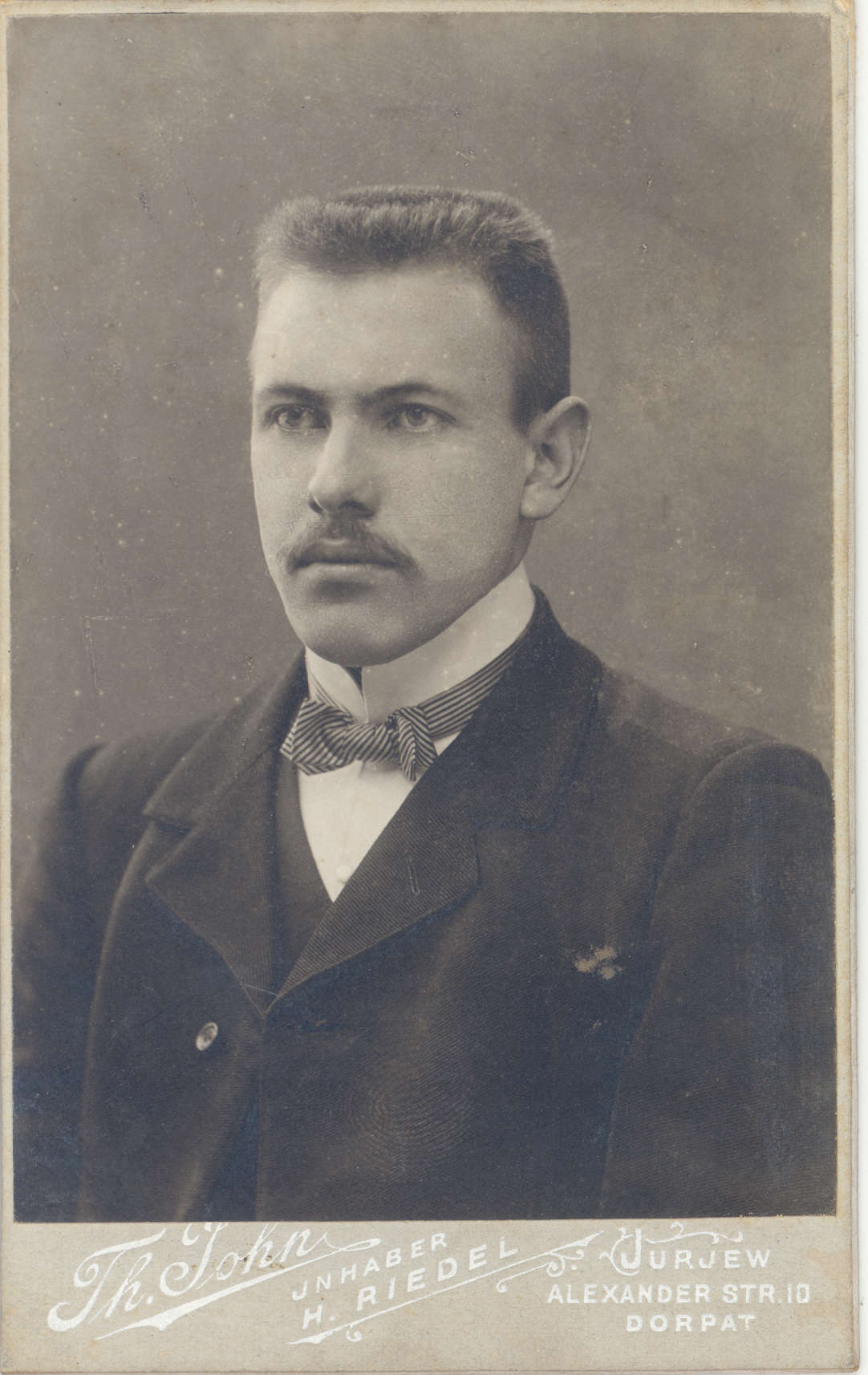
Bernhard Linde
Bernhard Linde (4 IV 1886 – 23 VII 1954) was a columnist, critic, prose writer, translator and publisher, one of the central figures of the Young Estonia grouping of writers.
Linde was born in Järvakandi parish in Harju County as the son of a farmer. He attended Lelle and Järvakandi primary schools, Pärnu gymnasium and, from 1903–1908, Hugo Treffner Gymnasium in Tartu. From 1908–1915, he studied at the University of Tartu where continued his studies after a long break in 1925. In 1927, he graduated from the University of Tartu specialising in Slavic languages.
Linde made a name for himself early as an editor, journalist and participant in Estonian literary life. He was one of the founding members of the Noor-Eesti (‘Young Estonia’) grouping and had a managerial role there. He took care of monetary matters and correspondence and represented the grouping when its leading figures like Gustav Suits and Friedebert Tuglas were abroad or underground.
In 1907–1909, Linde was a member of the editorial office of the journal Eesti Kirjandus (‘Estonian Literature’), in 1910–1911, editorial secretary of the journal Noor-Eesti (‘Young Estonia’), in 1912–1915, manager of the Noor-Eesti publishing house and, in 1914–1915, publisher in charge of the journal Vaba Sõna (‘Free Word’). During the First World War, he worked as an official of the tsarist army in Minsk and Vilnius governorates; in 1918–1919, stayed at the Estonian settlements in Siberia and the Far East and returned to Estonia in 1919. In 1919, he established the publishing house Varrak and was the chairman of its board and managing director until its bankruptcy in 1924. In 1925, Linde founded a new publishing house called Varak. In 1921–1922, he was chairman of the Drama Studio Society.
Linde travelled a lot in the 1920s and 1930s, mainly in Eastern Europe, acquainting himself with the cultural life of the countries speaking Slavic languages and popularising Estonian literature there. In the years of the German occupation, 1941–1944, he stayed on his father’s farm in the country. After the Second World War, Linde worked as a lecturer at Tallinn University of Technology for five years. In 1951, he was imprisoned because of ideological accusations. He spent three years in the prison camps of Narva and Vasalemma, was released in 1954 being terminally ill and died in Tallinn shortly afterwards.
The attitude to Linde’s literary creation, which includes short prose and some poetry, is mostly cautious. Linde’s main significance for Estonian literature lies in his managerial activities and literary criticism. He was active mostly as a translator, essayist and publisher. As a theatre critic, he wrote about drama and music theatre, particularly ballet. Along with reviews of contemporary Estonian literature, Linde wrote books about foreign authors. He published travel books and wrote politicians’ biographies. He also compiled anthologies of several European national literatures. Bernhard Linde was one of Anton Hansen Tammsaare’s closest co-workers. The monograph on Anton Hansen Tammsaare’s life, completed in 1944, remained in manuscript for 63 years.
Linde participated in translating Estonian literature into German and translated literary works into Estonian from German, English, Finnish, French, Polish, Serbian, Croatian, Slovene, and Czech. In 1929, Honoré de Balzac’s novel Isa Goriot (‘Father Goriot’) was published in Linde’s translation. Linde has also translated books by W. Reymont, E. Rigby-Eastlake, J. Hašek, E. Leino and H. Sudermann. His last translation was Konstantin Stanislavski’s Minu elu kunstis (‘My Life in Art’), published in 1948.
L. P. (Translated by I. A.)
Books in Estonian
Short prose
Heitlikud ilmad: Wäikesed skandalid murrangu-aja Eestist. Tartu: Noor-Eesti, 1913, 82 lk.
Kenad naised: eksootiliste naiste seiklusi. Tartu: Loodus, 1928, 76 lk.
Essays
Omad ja võõrad: esseed. Tallinn: Varrak, 1927, 163 lk.
Loova Kesk-Euroopa poole: kirjanduslikke ja teatrilisi reisimuljeid Lätist, Poolast, Tšehhoslovakkiast ja Ungarist. Tartu: Noor-Eesti, 1930, 320 lk.
Literary criticism
„Noor-Eesti“ kümme aastat. Tartu: 1918, 69 lk.
August Kitzberg: arvustuslik-elulooline essee. Tallinn: Varak, 1926, 46 lk.
Honoré de Balzac: elu ja looming. Tartu: Eesti Kirjanduse Selts, 1933, 151 lk.
A. H. Tammsaare oma elu tões ja õiguses: isiklike mälestuste, kirjade ja dokumentide põhjal. Tartu: Ilmamaa, 2007, 392 lk.
Biographies of politicians
Thomas Garrigue Masaryk: Tšehhoslovakkia Vabariigi presidendi elu ja töö. Tallinn: Varak, 1935, 77 lk.
Dr. Eduard Beneš: Tšehhoslovakkia Vabariigi teise presidendi elu võitluses oma rahva iseseisvuse eest. Tallinn: Varak, 1936, 88 lk.
Travelogues
Tõusva päikese mailt: reisivested Siberist, Jaapanist, Hiinast ja Indiast. Tallinn: Varak, 1925, 183 lk.
Rännakuid keeristes: matkamälestusi Saksast, Rootsist ja Venest Maailmasõja eel ja ajal. Tallinn: Varak, 1936. 175 lk.
Miscellaneous
Missugust walimiseõigust peame meie nõudma?. Tartu: Noor-Eesti, 1907, 35 lk.



